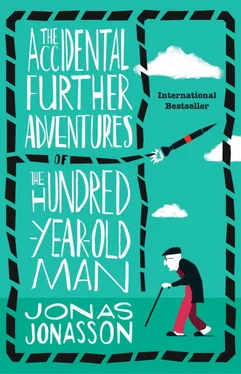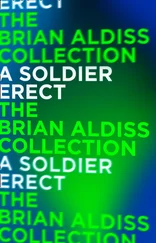‘And then a ship came to our rescue. That was quite a stroke of luck.’
‘Was it?’ said Julius, who had woken from his paralysis. ‘Couldn’t that ruddy ship have been from a country other than this one?’
‘Eat your breakfast, Julius. There are worse countries to end up in. Or maybe there aren’t, but here we are. And the food may be strange, but it tastes good.’
The table was laden with rice, fish, yellow soup of unknown ingredients, and something they called kimchi. The whole spread was completed with Western coffee and French croissants in an unholy alliance.
‘I recall when I was in China just after the war, to blow up bridges. Coffee was out of the question back then. But they did have vodka made from rice. I can think of worse ways to start the day.’
The minister for foreign affairs didn’t know whether to be impressed by Karlsson’s carefree nature or join Jonsson in his anxious state. Neither option was actually relevant to the gentlemen’s situation, though, so she let it go.
‘As the time of my departure necessarily approaches, I will inform you of the exact hour. If you turn up you turn up. Otherwise I promise to cause the biggest diplomatic brouhaha I can as soon as I’ve landed in the West. I know better than to pull at any more loose threads around here. If our friend in the palace should get the idea that I’m breaking any laws, he might very well have me arrested. A representative of the UN Security Council imprisoned in North Korea! That would lead to a crisis beyond anything we’ve seen so far. Do you understand the fix I’m in?’
Allan noted that the minister had finished her breakfast and was about to stand up. ‘May I have that croissant? As long as the minister is leaving, I mean.’
‘Dammit, Allan,’ said Julius.
Minister for Foreign Affairs Wallström said that Allan could help himself. With that she excused herself: she had business to attend to at the embassy to prepare for her upcoming meeting with Kim Jong-un. To what end? one might wonder, but still.
So she went. As she waited in the lobby for the limousine to roll up, she heard Karlsson telling his friend about President Erdogan in Turkey, who had called the entire population of the Netherlands Fascists, Chancellor Merkel of Germany a Nazi, and Israel a terrorist state that devoted most of its resources to killing children.
‘I don’t give a crap about what’s-his-name,’ Julius said, annoyed.
‘Nor do I, actually,’ said Allan. ‘But don’t you think he’s exaggerating a bit, this Turk?’
Margot Wallström was invited into the limousine. As she settled inside, she asked herself if the world had made Karlsson crazy, or if it was the other way around.
* * *
While Allan seemed uninterested in anything but the contents of his black tablet, Julius shaped up and decided to do what he could to increase the odds of survival for them both. Knowledge , in this context, was not a stupid place to start. He decided to stretch his legs with the aim of studying.
Ryugyong had four public exits. At each stood two guards, although they were called guides, always ready to lead the Swiss man and his assistant back up to their room if they tried to take off on their own. It would not be as easy to escape this hotel as it had been the last one, with or without a balloon. What, incidentally, had they thought they would do next? Were they going to stroll all the way through Pyongyang to the airport? Call a taxi? At what phone number? In which language would they order a car? How would they pay? And what made them think the alarm wouldn’t sound if they made an attempt?
How about a private driver then? The man who would drive them to and from the plutonium factory each day, over the next six days. Perhaps he would do them the kindness of swinging by the airport? If Allan charmed him as only Allan could…
Julius returned to the hundred-and-one-year-old in the breakfast room. It was almost nine o’clock. Allan had eaten up his kimchi and the remaining croissants, except the very last one, which he had stuck into his coat pocket for future use. He welcomed Julius back and said he had found new information on the tablet. Before Julius could stop him, he said that the cost for the wall between Mexico and the United States was going to be four times higher than it would cost to end the famine in East Africa.
‘The famine in East Africa?’
Julius hated Allan’s black tablet and longed for the old man as he had been before all the misery of the world had overtaken him.
‘And listen to this,’ Allan went on. The new hospital in Greater Stockholm had just been supplied with 165 faulty bathrooms. It turned out the water ran in the wrong direction. So they all had to be rebuilt, and surely doing that would cost half an African famine.
Julius blew up. ‘I’ve had enough of this. I sympathize with starving children and faulty bathrooms, but can’t you get it into your skull that we’re on our way to being shot within a few days? What if, for God’s sake, we took things in the proper order?’
Allan pretended to be hurt. ‘Have you thought of something on your own, then, while I was updating myself on life? Or have you spent the whole time moaning and groaning?’
Julius told him about the guards at the exits and reminded Allan of the rules they had to stick to. These included, incidentally, that they must be sitting in a car outside the hotel in under a minute. That car might be the solution to their transportation woes. It, and the man behind the wheel.
‘Then I suppose we should go and say hello to him. It’s always exciting to meet new people. Come, my friend. And chin up!’
The driver welcomed the foreign guests with a salute. Then he asked the gentlemen to climb into the back seat, preferably without bringing with them any of the mud from the puddles.
‘I’d rather sit in front, so we can chat,’ said Allan. ‘My, what fantastic English.’
Julius climbed into the back, and the driver had no time to guide Allan into the same back seat before he was settling into the front.
‘Not entirely proper,’ he said, once he was behind the wheel again.
‘My name is Allan,’ said Allan. ‘What might our driver possibly be called? I understand Kim is common.’
The driver said that his name was as inconsequential as he was. But he took his job seriously. As they knew, the gentlemen were expected to be ready at nine o’clock each morning to be transported to the laboratory, with their return journey scheduled for sixteen hundred hours. The nameless man was supposed to wait outside the laboratory each day in case of unforeseen incidents.
‘I hear the airport is beautiful,’ said Allan. ‘Perhaps we could take a look at it tomorrow or thereabouts. Would that suit Mr Nameless?’
It would not. The only departure from the route between hotel and laboratory would occur that afternoon, for the driver had orders to take the gentlemen to the leading shopping centre in Pyongyang.
‘But surely a little detour couldn’t—’
‘Yes, it could,’ said the driver.
He was not charming. Allan took his extra croissant from his coat pocket. The driver reacted with horror. He stopped the car and said that consumption of any sort was strictly forbidden in his car.
‘Throw that food in the ditch immediately!’
Throw away food? Was that such a bright idea? If Allan understood correctly, food was less common in this country than military parades.
‘No one starves in the land of the Supreme Leader,’ said the driver. ‘Now throw it away!’
Allan did as he said.
‘But that doesn’t mean you can’t be hungry,’ the driver added.
Then no more was said in the car until the next time the driver opened his mouth.
Читать дальше
Конец ознакомительного отрывка
Купить книгу












